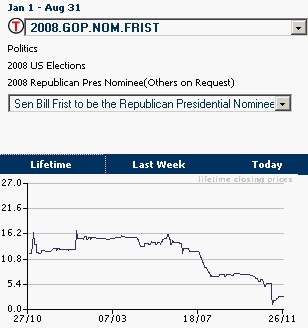Who's the Republican Frontrunner?Josh Gerstein
says it's John McCain.
Intensifying public concern about the war in Iraq, the prospect of protracted corruption trials in Washington, and renewed qualms among Republicans about federal spending are all putting wind into Mr. McCain's sails while setting back most of the senator's rivals for the nomination.
"If Iraq and foreign policy and national security and deficit spending are important issues, that will benefit people like McCain," the publisher of a leading political newsletter, Stuart Rothenberg, said.And indeed, if we look at
Tradesports' contract on the Republican Presidential Nominee, we see that McCain has been rising quite a bit lately (although still not where he was last year):

(Note: Tradesports uses the European convention for dates; 27/10 is October 27, 2004.)
Hugh Hewitt says Frist has pretty much blown it, unless he really gets the job done in 2006:
The Senate's GOP's go-along-to-get-along attitude explains Senator Frist's calamitous political situation, and should also dictate his moves when the Senate gets back from its very, very long Thanskgiving recess in mid-December: Get nominee Boyle a vote. Get nominee Kavanaugh a hearing and a schedule for a floor vote. Get a schedule worked out for all current and future judicial nominees for 2006. If Chairman Specter balks, convene the party caucus and remove him from the committee. Get the Patriot Act through the Senate.
In other words, Senator Frist cannot afford to waste December, not if he wants to be a serious contender for the GOP nomination in '08. He'll be out of the Senate in a year and running for president on exactly what? Having made Senator Reid happy, or having kept Senator Specter pleased?And again, Tradesports agrees:

A word of caution. A lot of people think these markets have good predictive powers. This is not the case. In 2000, for example, the Iowa Electronic Markets predicted that then-Governor Bush would win the election for most of October and early November. On election day, the market whipsawed back and forth as it looked like Gore would win, then Bush. (The same thing happened in 2004, with the exit polling fiasco). In the ultimate irony, the IEM paid out on the Gore contracts, as their pre-existing determining factor was the popular vote.
What markets like the IEM and Tradesports are good at is distilling the conventional wisdom, which is why they have gyrated wildly on the day of the last two presidential elections.



